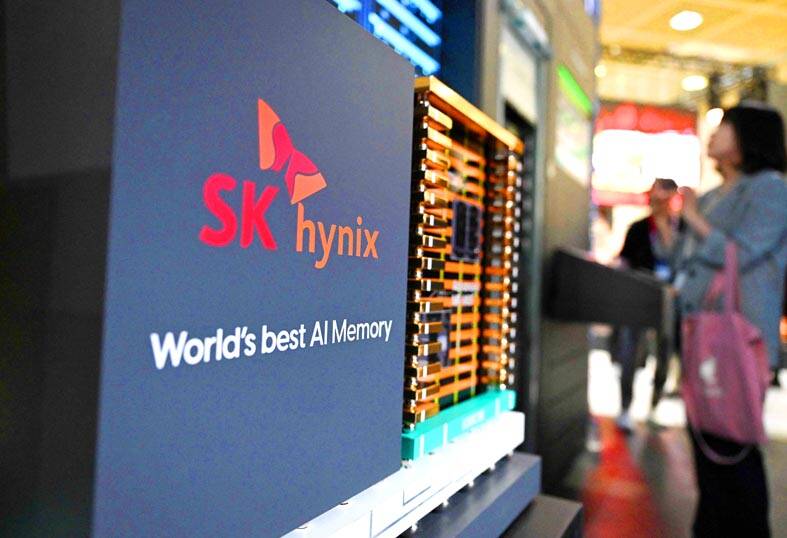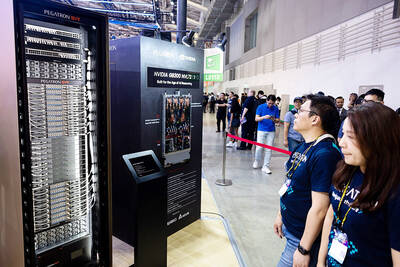SK Hynix Inc warned of increased volatility in the second half of this year despite resilient demand for artificial intelligence (AI) memory chips from big tech providers, reflecting the uncertainty surrounding US tariffs.
The company reported a better-than-projected 158 percent jump in March-quarter operating income, propelled in part by stockpiling ahead of US President Donald Trump’s tariffs.
SK Hynix stuck with a forecast for a doubling in demand for the high-bandwidth memory (HBM) essential to Nvidia Corp’s AI accelerators, which in turn drive giant data centers built by the likes of Microsoft Corp and Amazon.com Inc.

Photo: AFP
That SK Hynix is maintaining its HBM shipment growth guidance is encouraging, SLSA Securities Korea analyst Sanjeev Rana said.
“The key question on everyone’s mind is: ‘How will the tariffs impact tech demand in the later part of the year?’” Rana said.
It is difficult to assess the impact of US tariffs at this point, SK Hynix chief financial officer Kim Woo-hyun told analysts during an earnings conference call.
“With the expansion of protectionist policies such as tariff regulations and export restrictions, it has become more challenging than ever before to predict future market conditions,” he said.
While US clients account for about 60 percent of the company’s revenue, the percentage of direct exports to the US is “not that high,” with memory shipments for US customers often going to locations outside the country, he said.
For the March quarter, SK Hynix reported a better-than-expected operating income of 7.44 trillion won (US$5.2 billion) on a 42 percent rise in revenue. Customers asking for expedited shipments of advanced chips, as well as memory used in PCs and smartphones, helped the company clock its second-highest quarterly performance, on the heels of record revenue and operating profit in the prior quarter.
SK Hynix executives also sought to reassure investors that tariff-driven stockpiling would not lead to excess customer inventory, which could weaken demand and hurt earnings in the second half of the year. Chipmakers are more likely to factor in market uncertainties and temper production plans, limiting the size of possible supply gluts or sudden drops in demand, they said.
DeepSeek’s low-cost models have also spurred companies and governments around the world to invest more in AI infrastructure, according to the Icheon, South Korea-based company.
“This has led us to believe that there’s no doubt that HBM will continue to experience strong long-term growth in demand,” one executive said.
SK Hynix is actively working with Nvidia on its next-generation HBM4 and is expanding factories focused on high-end DRAM to cement its lead. Its M15X plant, under construction in the southern South Korean city of Cheongju, is on track to open in the fourth quarter, the company said.
Total investment on the site is projected to be more than 20 trillion won.
SK Hynix said sales of 12-layer HBM3E — a cornerstone of the company’s AI memory strategy — are expected to increase to account for more than half of total HBM3E revenues in the second quarter. That chip is currently the most advanced HBM on the market that works alongside Nvidia’s graphic processing units.

AI TALENT: No financial details were released about the deal, in which top Groq executives, including its CEO, would join Nvidia to help advance the technology Nvidia Corp has agreed to a licensing deal with artificial intelligence (AI) start-up Groq, furthering its investments in companies connected to the AI boom and gaining the right to add a new type of technology to its products. The world’s largest publicly traded company has paid for the right to use Groq’s technology and is to integrate its chip design into future products. Some of the start-up’s executives are leaving to join Nvidia to help with that effort, the companies said. Groq would continue as an independent company with a new chief executive, it said on Wednesday in a post on its Web

RESPONSE: The Japanese Ministry of Finance might have to intervene in the currency markets should the yen keep weakening toward the 160 level against the US dollar Japan’s chief currency official yesterday sent a warning on recent foreign exchange moves, after the yen weakened against the US dollar following Friday last week’s Bank of Japan (BOJ) decision. “We’re seeing one-directional, sudden moves especially after last week’s monetary policy meeting, so I’m deeply concerned,” Japanese Vice Finance Minister for International Affairs Atsushi Mimura told reporters. “We’d like to take appropriate responses against excessive moves.” The central bank on Friday raised its benchmark interest rate to the highest in 30 years, but Bank of Japan Governor Kazuo Ueda chose to keep his options open rather than bolster the yen,

Even as the US is embarked on a bitter rivalry with China over the deployment of artificial intelligence (AI), Chinese technology is quietly making inroads into the US market. Despite considerable geopolitical tensions, Chinese open-source AI models are winning over a growing number of programmers and companies in the US. These are different from the closed generative AI models that have become household names — ChatGPT-maker OpenAI or Google’s Gemini — whose inner workings are fiercely protected. In contrast, “open” models offered by many Chinese rivals, from Alibaba (阿里巴巴) to DeepSeek (深度求索), allow programmers to customize parts of the software to suit their

Global server shipments are expected to surge to 15 million units next year, from 4 million units this year, with artificial intelligence (AI) servers accounting for about 30 percent, driven by massive capital spending by major cloud service providers, the Market Intelligence and Consulting Institute (MIC) said on Thursday last week. Major cloud service providers — including Google’s parent company Alphabet Inc, Microsoft Corp, Amazon.com Inc and Meta Platforms Inc — are projected to budget US$450 million for capital expenditure next year, up from US$400 million this year, MIC ICT [information and communications technology] Industry Research Center director Edward Lin